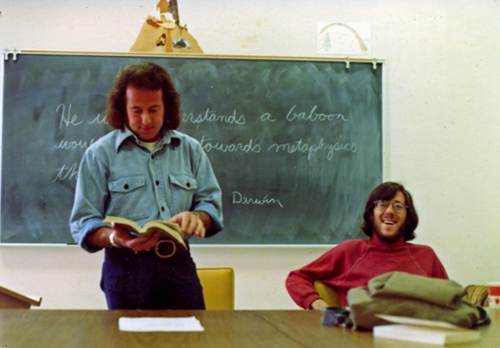Scholarship honors family’s humanities legacy
The roots of the Jay family tree are deeply seated in the Humanities Division at UC Santa Cruz. Greg (Porter ‘74, literature) and his older brother Paul (Porter ‘75, literature; Ph.D. ’81) both pursued humanities degrees and had long careers as professors of literature. Greg met his wife, Martha, while attending UCSC, and Paul married alumna Lynn Woodbury, who earned a doctorate in literature at UCSC in 1983.

To honor their family legacy, Greg and Martha established the Jay Family Humanities Scholarship for students pursuing a humanities degree.
Having had a distinguished career teaching college literature, Greg knows first-hand the struggles of students who aspire to careers as journalists, teachers, policymakers, academic thought leaders, and authors.
“I have seen case after case of young people whose aspirations had been thwarted because they didn’t have the money to complete their degree or complete it the way they wanted,” Greg said. “Student debt narrows the imagination of students and restricts their growth. I decided I could use some of my resources to start making a small step toward eliminating the barriers.”
The scholarship is awarded to a student in financial need who displays a strong interest in the study of the humanities and has an academic focus on social justice and diversity.
The scholarship was awarded to Mikayla Jordan (Kresge, ’23), who transferred to UCSC in the fall 2021. The Sacramento native is studying critical race and ethnic studies (CRES)—the Humanities Division’s newest department—and aspires to teach secondary history or ethnic studies.
Jordan, who works part time to help pay for her education, says the scholarship will relieve a significant amount of her financial burden, enabling her to focus on her classroom success.
“This scholarship means the world to me,” said Jordan. “This scholarship will set me up for success as I continue to focus on my studies. I am so grateful to the Jay Family.”
Jordan and Greg share a passion for critical race studies. Greg helped the teaching of literature in higher education be more inclusive. In the 1980s, as a self-identified rebellious young professor at the University of Alabama Tuscaloosa, he revised course materials to include books by authors who represented diversity as individuals and in their writing. This was a bold move at a university infamous for former Alabama Governor George Wallace’s actions to protect segregation in 1963.
“That experience led me to get involved in changing the movement of higher education,” said Greg. “It changed the canon of what we taught—and infused courses with different writers that represented what we now call diversity.”
He became an influential voice in higher education and a coveted national speaker. He wrote a book about his model, America the Scrivener: Deconstruction and the Subject of Literary History (Ithaca: Cornell UP, 1990), and taught teacher-education students how to incorporate multiculturalism in the classroom.
Greg is Professor Emeritus of English at the University of Wisconsin-Milwaukee, where he taught in the Literature and Cultural Theory program for more than three decades. During that time he spent 13 years as senior director of the Cultures and Communities program, a community-based learning initiative aimed at building and strengthening student engagement with the Milwaukee community. Recognized by the Carnegie Foundation for the Advancement of Teaching, the program is being modeled in colleges nationwide.
Greg says he relied on skills learned through the humanities at UC Santa Cruz to help him develop the program, which required intensive work with community organizations in Milwaukee.
“My humanities education prepared me to be a good listener, to empathize with other people–their struggles and their perspectives–and to realize that there were stories that weren’t being told, and those stories could change the world, or at least parts of it.”
It was at UWM that Greg recruited fellow history faculty colleague, Jasmine Alinder, Ph.D., now humanities dean at UC Santa Cruz, to work in his program. A historian, Alinder directed an award-winning digital humanities project, March on Milwaukee Civil Rights History Project, that educators nationwide have added to their Civil Rights curricula.
“I knew that if UC Santa Cruz Humanities was hiring Jasmine, it was going in a direction that I was excited about,” said Greg, who says collaborating with Alinder was one of the greatest experiences of his tenure at UWM.
Greg, now retired, and Martha are happy to channel their enthusiasm for the UCSC Humanities Division into the Jay Family Humanities Scholarship. The scholarship will lessen the financial burden for Humanities students—and increase their opportunities to change the world.